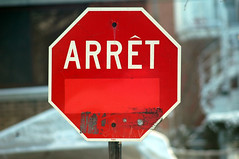"One man's fish is another man's poisson"
One of the things that has been particularly fascinating to me since arriving here is the way that language is used here in Montréal. It is the first time I have lived somewhere truly bilingual. Canada is officially a bilingual country, but Québec is an entirely French province. Some parts, like Québec City, have little difference from France. Montréal though has a fascinating mix of "Anglo" and French, along with many other nationalities, Jamaican and Arabic being some of the most prevalent. It even varies between parts of the city. Notre-Dame-de-Grace, where we live, is a very Anglo area, as are most parts West and South of the mountain. On the other hand, the Plateau, Outremont, and areas East and North of Mont Royal tend to be more French.
On first impressions, you would think that you were surrounded by French speakers, because all the signs, billboards, store fronts and even announcements on the Metro are in French. Most stores and businesses have different names here - Kentucky Fried Chicken is branded here as PFK (Poulet Frit de Kentucky) and Staples is Bureau en Gros (literally "Office Wholesale"). Business owners and restauranteurs will often greet you in French, and when you attempt to respond in French, they will continue to converse with you in French. And this isn't surprising since 70% of the population speak French as their first language.
What has amazed me is that everyone you encounter - from waitresses to bus drivers to even the homeless - can speak both English and French to some degree. And for the majority, they are pretty much fluent in both languages. As a result, there are some pretty strange customs about conversation, and you regularly see people swap language mid-conversation. Waitresses greet you with "Bonjour. Hi." so you can respond in French or English. The etiquette is that you should always respond in the language in which you are addressed - unless you really are not able to. This works two ways - if you go into a shop and ask a question in English, this is not as rude as it would be in France (although it does mean you will probably be considered a tourist). The person will respond and help you in fluent English (it might be a bit less fluent on the East side of the city though).
There's also this effect where people "size you up" to try and judge your likely language, and address you in that language.. sometimes getting it completely wrong, such as a checkout girl in Bouclair (a bit like the Pier) who was chatting to away her colleague in English as a native English speaker would, and completely threw us by turning around and addressing us in fluent French!
It turns out that the key thing here is understanding what's been said, and then it almost doesn't matter what language you respond in. I've even seen a mother and child conversing on the bus, where everything the daughter said was English, and everything the mother said was French. This was completely natural for them!
For my wife and I, the implications are somewhat different. For her, working in academia where English is the language of science, and being able to get served in English fairly reliably, means French is not as critical. For me, as someone who is likely to be working with people - and therefore could be addressed in French or English at any time, it is vital that I can understand and converse in French. So I've dusted off my 1995 A-Level and started putting it to use in everyday conversation. We've both found that when you're immersed in a language, a lot comes back to you, that you didn't think you knew. (Although it's not really a total immersion here - since you can switch out to English at any time).
Generally I've found my understanding is pretty good, I just need to sharpen up my vocabulary and pronunciation and gain a bit more confidence. Fortunately, as I mentioned in a previous post, I've been getting some French lessons, and I now have a second person I meet with for French conversation practice, which is particularly useful.
All in all, it's quite a unique environment to live in, and for me it reinforces the observation I made while in India last year - wherever you go, people are just people, with the same basic needs and desires - and language and cultural variation are just like layers masking that truth from being immediately obvious. I hope that in future as the world becomes more globalized, more people will become aware of this and just maybe, there could then be a little less trouble between nations and religions.
Update: I have just remembered something I intended to write with this post but forgot to include. I was thinking about how I might explain what it feels like here in terms of the balance between North American, French, and European influences. Here's what I came up with. If I wanted to create a city that felt like Montréal, here's what I'd do. Take one US city, with a lot of space and low population density. Send all the Americans living there away to a quiet part of France for 10 years so they become fluent in French and European in attitudes (They'd probably take their holidays in the UK and lose a few Americanisms too). Meanwhile, move a city full of French people into the city, so that they set up French businesses, infrastructure, signage etc. Make sure that they do business with the US and so they will have to become fluent in English as well. Pick a nice old city in France and select some of the nicest 100-200 year old buildings and transport them brick by brick to the center of this new city, to make it feel more French (this will be the old town). Now after the French have been in the city for 10 years and adapted themselves to North American culture, bring the Europeanised Americans back to integrate with the Americanised French. Let them set up their businesses in the city but only if done in a French way, or at least a more European way than they would in the US (although they can still link in with their business contacts and chains back in the US). Leave everything to blend for another ten years and there you have it. That's what Montréal feels like to me. An American city, with a layer of French culture and history, with a mix of English & French language, a mix of American and French businesses, and full of bilinguals, some more French, some more Anglo, but all of whom are more European in manner than American but yet have all adapted to a North American way of life!


1 comments:
Really interesting Alex
Post a Comment